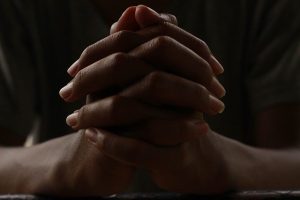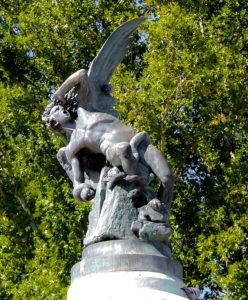What are demons, what fate awaits them, and does their damnation fit their crimes? Most Christians, ranging from Roman Catholics all the way to evangelical protestants, have  argued against it. However, in the Book of Enoch (often called 1 Enoch), we find a story in which the main character (Enoch himself) actually intercedes on behalf of fallen angels before God. Why does he do that, and what is the outcome? And what meaning could we draw from this story today as we wrestle with modern demons of our own?
argued against it. However, in the Book of Enoch (often called 1 Enoch), we find a story in which the main character (Enoch himself) actually intercedes on behalf of fallen angels before God. Why does he do that, and what is the outcome? And what meaning could we draw from this story today as we wrestle with modern demons of our own?
Table of Contents
What is 1 Enoch?
1 Enoch is a Jewish text that predates the birth of Jesus. Although most Christian and Jewish groups don’t consider it part of their canon, it had a profound impact on both.
Consider Jude 1:14-15:
It was also about these that Enoch, in the seventh generation from Adam, prophesied, saying, “See, the Lord is coming with ten thousands of his holy ones, to execute judgment on all and to convict all the ungodly of all the deeds of ungodliness that they have committed in such an ungodly way and of all the harsh things that ungodly sinners have spoken against him.”
Compare that with 1 Enoch 1:9 (translated by E. Isaac):
Behold, he will arrive with ten million of the holy ones in order to execute judgment upon all. He will destroy the wicked ones and censure all flesh on account of everything they have done, that which the sinners and the wicked ones committed against him.
Many major players in the development of early Christianity considered 1 Enoch to be worth engaging with; consider what Tertullian wrote:
I am aware that the Scripture of Enoch, which has assigned this order (of action) to angels, is not received by some, because it is not admitted into the Jewish canon either…
If (Noah) had not had this (conservative power) by so short a route, there would (still) be this (consideration) to warrant our assertion of (the genuineness of) this Scripture: he could equally have renewed it, under the Spirit’s inspiration, after it had been destroyed by the violence of the deluge, as, after the destruction of Jerusalem by the Babylonian storming of it, every document of the Jewish literature is generally agreed to have been restored through Ezra.
But since Enoch in the same Scripture has preached likewise concerning the Lord, nothing at all must be rejected by us which pertains to us; and we read that “every Scripture suitable for edification is divinely inspired.”
Clearly, 1 Enoch was an important text, not only in the Jewish context in which it was developed, but for early Christianity. So what does it say? Continue below to keep reading!
The Origin of Demons
1 Enoch is actually composed of multiple smaller “books”. Book I, composed of chapters 1-36, is also called “The Parable of Enoch” and will will be the focus of this blog post. It tells the story of a time described in Genesis leading up to the “Flood” or the “Great Deluge”.
According to this myth, a group of 200 angels began falling in love with human women, whom they wanted to marry and have children with (6:6). The leader of these angels, Semyaz (or Semyaza), knew this violated God’s will and worried that the the other angels would not stand with him, but the others agreed to make a pact (or a “curse”, according to the text) that would bind them to this decision (6:5). 
Interestingly for a story set in this time, the angels were monogamous– they each only chose a single woman (7:1). They treated their wives well, teaching them angelic secrets ranging from magical medicines to astrology to alchemy (7:2 – 8:4). However, before long, the wives began giving birth to children, who grew to be giants 300 cubits (7:2) high– that is, about 450 feet tall!
These giants were ravenous and consumed almost all the food that the pure humans grew (7:3)! And yet they were not satiated from this, so they began eating animals of all sorts: wild beasts, fish, birds, and even reptiles (7:5). But their hunger continued growing and they turned to cannibalism– even eating human flesh and drinking human blood (7:6).
God’s Intervention– The Great Deluge
This nightmarish scenario was seen by angels who had not entered the pact with Semyaz, particularly the angels Michael, Gabriel, and Surafel. They reported to God– “the Most High, the Great and Holy One!” (10:1), who sent an angel named Asuryal to Noah. Asuryal warned Noah that God was going to destroy the work of the giants, but Noah’s lineage– unmarred by procreating with angels– would be spared and would populate the earth anew (10:2-3).
Then, God sent the Angel Raphael to bind the hands and feet of one fallen angel in particular– Azaz’el, who had taught humans how to make weapons and armor in order to oppress the earth (8:1; 9:6; 10:4). Azaz’el was blinded with a face covering and cast into darkness where he will wait eternal torment by fire on the great day of judgment (10:6-7).
God next instructed Gabriel to destroy the children of adultery, and the children born to unwed mothers, and the children of angels (called “Watchers” in the text) and humans (10:9). God warned Gabriel that these children would beg for forgiveness and yearn for eternal life (10:10), but that he would not permit this to happen. God would ordain the children to wage war against each other until they had seen the destruction of those they held most dear (10:12), and then would be bound up like Azaz’el and cast into darkness until the fires of eternal damnation are ready to receive them on the day of judgment (10:13).
God tells Gabriel that this is all for the benefit of mankind, for once the scourge of the Watchers (the fallen angels) and their progeny is removed from the earth, “all the children of the people will become righteous, and all nations shall worship and bless me” (10:21). God promises Gabriel that this will result in the earth being “cleansed from all pollution, and from all sin, and from all plague, and from all suffering” (10:29).
Sympathy for the Devils
And yet, from the Watchers’ perspectives, this was all incredibly unfair. They had fallen in love, they had married, and they had children. They shared their wisdom (given to them by God) with the earth.
The Watchers were frightened, afraid and trembling (13:3); they begged Enoch– the hero of our tale– to plead their case before God, to write for them a “memorial prayer” and a “prayer of forgiveness” (13:4), since they themselves were bound and unable to pray (13:5). Enoch agreed to do this, since he determined that their contrition was genuine and lasted for for days (13:6).
Enoch went to the waters of Dan and prayed to God on the Watchers’ behalf until he fell asleep (13:8). When he slept, God granted him a vision in which Enoch learned that the prayers of the Watchers will “not be heard throughout all the days of eternity”, and that Enoch’s “petitions on their behalf will not be heard”, even as Enoch interceded for them with prayers and weeping (14:7).
God instructs Enoch to tell the Watchers the following:
You were once in heaven, but not all the mysteries of heaven are open to you, and you only know the rejected mysteries. Those ones you have broadcast to the women in the hardness of your hearts, and by those mysteries the women and men multiply evil deeds on the earth… therefore, you will have no peace!
God as depicted in 1 Enoch’s first book is intense! At some level, it almost sounds like a setup: the Watchers thought that they knew divine mysteries, but the mysteries they knew were actually rejected by God. And it’s because those mysteries weren’t endorsed by God that they led to such suffering. It makes you wonder– why did the Watchers, the fallen angels, only know rejected mysteries prior to their condemnation? Is it because God chose for them to fall? Or is there more going on?
Empathy for the Devils
This is a difficult text for us modern readers to grapple with, on multiple levels. Many of us might particularly wrestle with the depiction of the Watchers. They clearly align with the concepts we now associate with “demons”– fallen angels who gave humans forbidden knowledge that resulted in widespread devastation, and who are condemned by God to suffer for all eternity without the possibility of forgiveness. It certainly checks all the boxes. And yet, the demons in this story are profoundly empathetic.
To summarize an empathetic retelling of the story: angels see humans created by God and find them beautiful. They wed the humans, entering into monogamous marriages (at a mythological context when monogamy was uncommon), and reared children. They taught their wives and children divine mysteries from God.
However, it turns out that these divine mysteries were, unbeknownst to them but known to God, actually corrupt. Their progeny became monsters who grew to consume all the resources, through both ethical and unethical means, of their nearby communities. The children saw each other as commodities to literally be consumed. These corrupt children created war, strife, and oppression. And not due to malevolence on behalf of their parents, but because the divine mysteries their parents knew were unexpectedly… demonic.
And yet, still the Watchers repented. They cried out to God, asked for forgiveness, and even sought a mediator. And yet God rejected their pleas, condemned them as unforgivable, and left them with the inexpressible anxiety and horror that Hell itself lies at the end of their imprisonment.
What do we do with this?
Two Modern Readings of the Suffering of the Watchers
In this section, we will explore two competing ways to read this text and to apply this story: a metaphorical interpretation and a demiurgical interpretation. One could certainly go other ways with it. What I could not fathom, however, is an interpretation that is both mythologically literalist (i.e., “we should think in terms of these all being actual entities that existed”) and being consistent with a Christian conception of God (who would be unwilling to forgive the truly contrite, particularly when their complicity in their sins is… ambiguous at worst).
First, a metaphorical interpretation. Consider the non-human forces in your own life that, when they become part of your story, birth horrific progeny. For example: alcohol abuse. Alcohol can evoke intense cravings and longing, to such a degree that one can commit one’s life to it. And the altered headspace it brings can feel like forbidden knowledge, divine mysteries. And yet, consider its progeny– alcoholism. While alcohol itself might not be evil, when it marries with one’s identity to such a degree that it impacts their future, the results are devastating. It can consume and consume until there’s nothing left.
One could interpret the story of the Watchers in a way that enlightens us about the modern kinds of demons we face; addiction, in particular, stands out as a useful application of the metaphor. The things we become addicted to are often not evil in and of themselves, but when they marry us– and that marriage is monogamous, it commits to us and we commit to it– then all that follows is horror. The only hope, then, is a condemnation not only of the resulting behavior/progeny, but of the source substance, itself.
Alternatively, one could interpret 1 Enoch’s story of the suffering of the Watchers in a different fashion: from a demiurgical perspective. As readers of this blog know, many early Christians thought that the god of the Old Testament was actually not the true God, the true father of Jesus. Some thought the god of the Old Testament, the Demiurge, was some sort of moral monster; others thought that he was a divine governor appointed by God but nevertheless not supreme.
Thinking about 1 Enoch from the perspective of what I’ll call a negative demiurgical approach (one where the Demiurge is a moral monster) makes some degree of sense with this narrative. In this telling, we could understand the Watchers to actually be tragic heroes. They loved humans, and they loved humanity. They shared the secret wisdom they had with us, and they united with us.
And yet it was all a setup by the Demiurge, who tainted their divine knowledge with traps that would lead to human oppression, all so we would blame the Watchers. If the Demiurge hadn’t cursed their wisdom to be folly, would any of the fallen angels’ actions actually have been bad? Perhaps not. Perhaps, in this take, true moral blame lies at the feet of the Demiurge, who tricked the Watchers into doing evil when they thought they were doing good and who would condemn them to an eternity of suffering in hell for decisions that were not in his, not in their, control.
What do you think? Do either of the above interpretations resonate with you? Are there other ways of looking at this text that make sense? And how do you apply your conclusions to the way that canonical scripture (like Jude) and some prominent early Christians like Tertullian leveraged this text?
